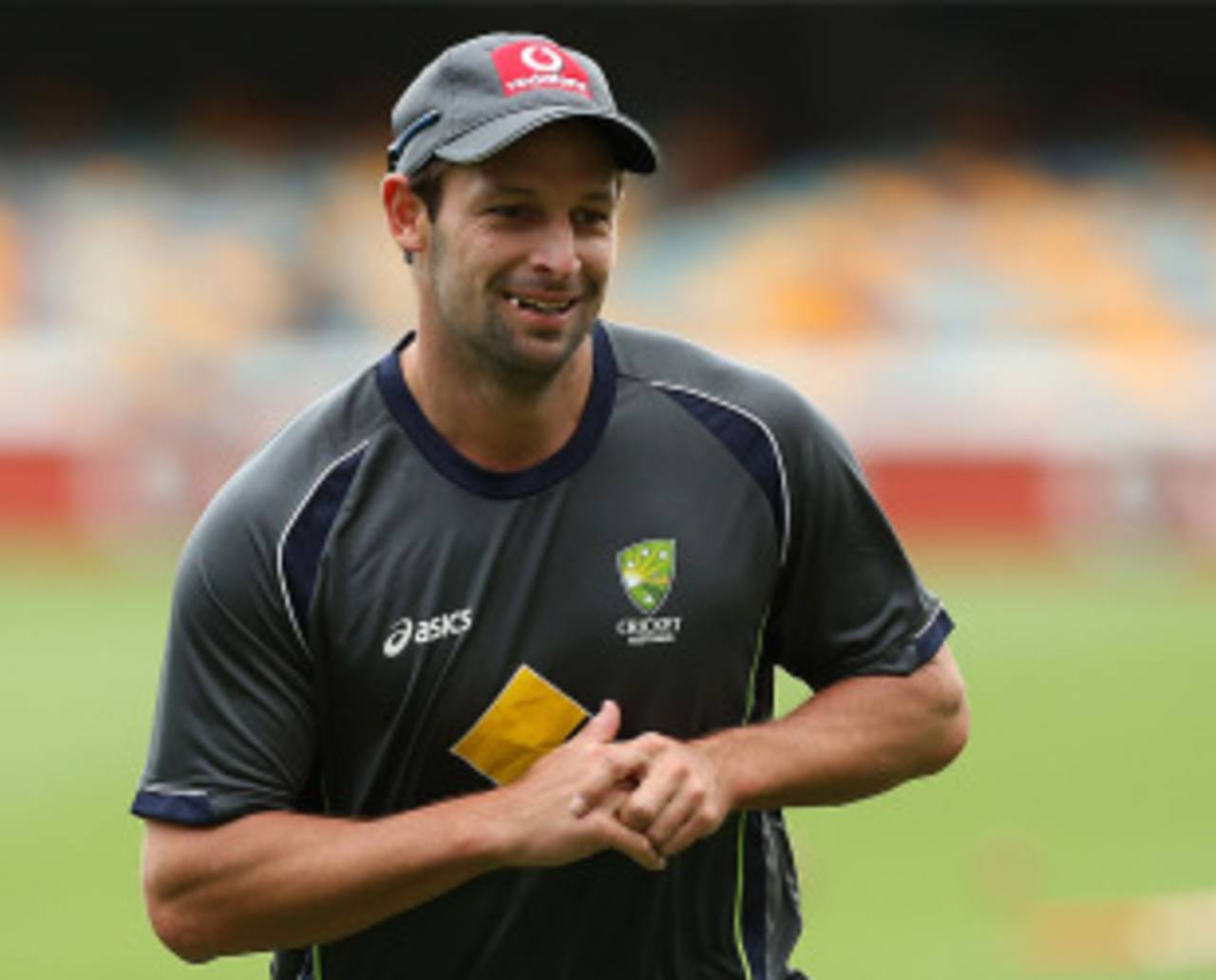The youngest veteran in town
What does it take to be counted as an old-timer these days? Not much, it would seem
Steven Lynch
Feb 7, 2013, 3:01 AM

Ben Hilfenhaus: that'll be "Sir" to you • Getty Images
An article on this site last week, reporting Australia's selections for their upcoming tour of India, talked of the return of Xavier Doherty and Steve Smith, and the inclusion of the uncapped pair of Moises Henriques and the new dollar millionaire Glenn Maxwell. And then, moving to those who missed the boat: "The veteran Ben Hilfenhaus […] was not selected." Well, I thought, Hilfy was on the last Ashes tour, but is he really a veteran? So I looked him up. And, as Private Eye would say, Ben Hilfenhaus is 29.
Veterans - like policemen - seem to be getting younger all the time. A few years ago the then editor of Wisden put "veteran" on his list of words to avoid in the Almanack - because, I rather suspected, he was himself at that awkward age when you have to talk about the retirement of people who are just a bit younger than you. And no one wants to feels like a veteran, do they?
Cricket has always been rather good at veterans, stretching all the way back to WG Grace, who played a Test match when he was 50 and only stopped because, he admitted, "the ground is getting further away", which was affecting his fielding. Three other 50-year-olds have played Tests, two of them in the same series in 1929-30: in the final match, in Kingston, Clifford Roach of West Indies was caught by England's George Gunn (aged 50) off the bowling of Wilfred Rhodes (52), to establish a combined age record for a dismissal that will surely never be beaten.
The other 50-year-old was one of the most unlikely Test cricketers of all: Bert Ironmonger, the Australian slow left-armer, who flicked the ball off the stump of a forefinger mutilated in a childhood argument with a piece of farm machinery. "Dainty" (so nicknamed because he wasn't) made his Test debut at 45, in his 50th year, returned the startling figures of 11 for 24 against South Africa on a sticky wicket in Melbourne, and played in four Tests of the 1932-33 Bodyline series when past his half-century. In the final Bodyline Test, Ironmonger - a strong candidate for the worst fielder ever to play international cricket - ruined Harold Larwood's chances of a century by somehow hanging on to a catch after England's nightwatchman had made 98.
Even now, in the high-octane T20 era, the odd player still claims the limelight as he approaches his forties: Sachin Tendulkar hits the big Four-O in April, Robert Croft and Mark Ramprakash made it to 42 before giving up last season, and 43-year-old Shane Warne is still playing and making headlines. Jacques Kallis, 37, is in the veteran stage for someone who bowls pretty rapidly, while Shivnarine Chanderpaul (38) has been around so long, he's in danger of playing alongside his son, who is about to make his debut for Guyana.
It set me wondering about the youngest cricket veteran of all. My money would probably be on David Steele, the England hero of the 1975 Ashes series, plucked from county obscurity by Tony Greig to take on Dennis Lillee and Jeff Thomson. Rocking on to the front foot then hooking and pulling the fearsome pair, Steele made such an impression in his maiden series that he won the BBC Sports Personality of the Year award, not to mention 365 lamb chops from his local butcher (one for each run he scored in his three Tests). Steele was an unlikely looking star, grey-haired and bespectacled. He was memorably dubbed "the bank clerk who went to war" by Clive Taylor of the Sun, and on his debut at Lord's was greeted at the crease by Thommo with "Who's this? Groucho Marx?" But actually he was only 33 at the time.
His hair went steely-grey at a very early age. "It started to go when I was about 16," he wrote, "which was fine if I wanted to get in a pub under age, but dodgy when I tried to go in the boys' entrance at Stoke City... This copper's hand dropped firmly on my shoulder: 'You've got more grey hairs than my father - go on, out of it.'"
It's true that performers in some other sports hit the veteran stage earlier than cricketers. Rebecca Adlington, Britain's double gold medallist from the Olympic swimming pool in Beijing, has just retired at the grand old age of 23. It's rare to spot a gymnast over the age of 21 - Beth Tweddle, who finally won an Olympic medal in London aged 27, is very much an exception these days. And perhaps the ultimate example is in tennis, where Martina Hingis won five Grand Slam singles titles before turning 20, retired (twice), and was playing "legends" events by the time she was 29, thus leapfrogging the "veteran" stage altogether.
I don't think I'd raise an eyebrow if Warne or Chanderpaul or Kallis was called a veteran (although Warnie is in more danger of being typecast as an old rogue), but I reckon I would lobby for the dictionary definition of a veteran cricketer to say he had to be at least 35. I'm sure Ben Hilfenhaus would approve.
Steven Lynch is the editor of the Wisden Guide to International Cricket 2013